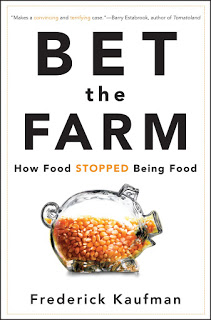 Bet the Farm, a recent book by Frederick Kaufman, is a deeper look at the subject of Kaufman’s 2010 article in Harper’s Magazine, “The Food Bubble: How Wall Street Starved Millions and Got Away With It.” That article, which, as someone who isn’t a Wall Street trader or multi-millionaire investor I had to read a number of times, looked at the exploding cost of wheat in 2008. That year, the price of the world’s most basic foods doubled, and then doubled again. In response, hunger and food riots broke out across the world. Since then, the cost of food has continued to rise, reaching a new pinnacle in 2011. In Bet the Farm, Kaufman makes the case that it’s the financialization of food that has led to this new era of escalating commodity prices, and hence, ever escalating food prices. As he explains, “Food had become an investment, equivalent to oil, gold, silver, or any other commodity, equity, or derivative. The higher the price, the better the investment. The better the investment, the most costly the food. And those who cannot pay the price pay with hunger.”
Bet the Farm, a recent book by Frederick Kaufman, is a deeper look at the subject of Kaufman’s 2010 article in Harper’s Magazine, “The Food Bubble: How Wall Street Starved Millions and Got Away With It.” That article, which, as someone who isn’t a Wall Street trader or multi-millionaire investor I had to read a number of times, looked at the exploding cost of wheat in 2008. That year, the price of the world’s most basic foods doubled, and then doubled again. In response, hunger and food riots broke out across the world. Since then, the cost of food has continued to rise, reaching a new pinnacle in 2011. In Bet the Farm, Kaufman makes the case that it’s the financialization of food that has led to this new era of escalating commodity prices, and hence, ever escalating food prices. As he explains, “Food had become an investment, equivalent to oil, gold, silver, or any other commodity, equity, or derivative. The higher the price, the better the investment. The better the investment, the most costly the food. And those who cannot pay the price pay with hunger.”
The book takes the author around the world in his quest to answer the question: “Why can’t inexpensive, healthy, and delicious food be available to everyone?” Kaufmann reports from all kinds of places you wouldn’t necessarily associate with food. There’s the World Economic Forum in Davos, Switzerland, where world leaders and experts talked about world hunger and the billion people going hungry. In an effort to understand how fast food pizza is trying to feed the world, he visits the headquarters of Domino’s Pizza and Tyson Foods. That leads him to the universities that are ground zero for the next generation of patented, corporate-owned, genetically modified seeds, and a farm that provides millions of tons of tomatoes to the global market. Finally, he winds up at the Chicago Mercantile Exchange and the Minneapolis Grain Exchange, where dairy products and grain once exchanged hands but where transactions now take place virtually, in an elaborate scheme based on futures, hedges and derivatives that has created instability for our farmers and our food system, led to increased hunger, and amassed fortunes for the traders and financial companies that have created these financial products.
Through his travels and conversations, Kaufman sums it up this way, which is pretty much what I’ve learned here at Farm Aid:
Bankers and traders sit at the top of the international food chain—the carnivores of the system, devouring everyone and everything below. Near the bottom toil the farmers. For them, the rising price of grain should have been a windfall, but speculation has also created spikes in everything the farmers must buy to grow their grain—from intellectually licensed seeds to transnational fertilizer to diesel fuel. At the very bottom of the food chain lie the consumers. Average Americans, who spend 8 to 12 percent of their weekly paychecks on food, may not immediately feel the crunch of rising costs. But for the roughly two billion people across the world who spend more than 50 percent of their income on food, the effects are staggering.
Peppered with interviews with interesting folks, from CEOs and Bill Gates to farmers and millionaire survivalists, and including some longtime Farm Aid friends and partners, Bet the Farm is a fascinating and challenging read. The economics of food are convoluted and complicated. But the end game is easily understood: More people are hungry on our planet than ever before, despite the fact that we are producing enough food for everyone to eat three square meals a day. The day to day challenges that farmers face in bringing food to market—drought, floods, pests, crop failures–may not be the downfall of our globalized, industrialized, financialized food empire. The fact that food primarily exists now not to sustain us bodily, but financially, may in fact turn out to be our ruin.
The Harper’s article by Frederick Kaufman has been archived, but you can read an interview with him here.
If you’re interested in reading Bet the Farm, find it in your local library or bookstore!
If you’ve read it, let us know what you think.


